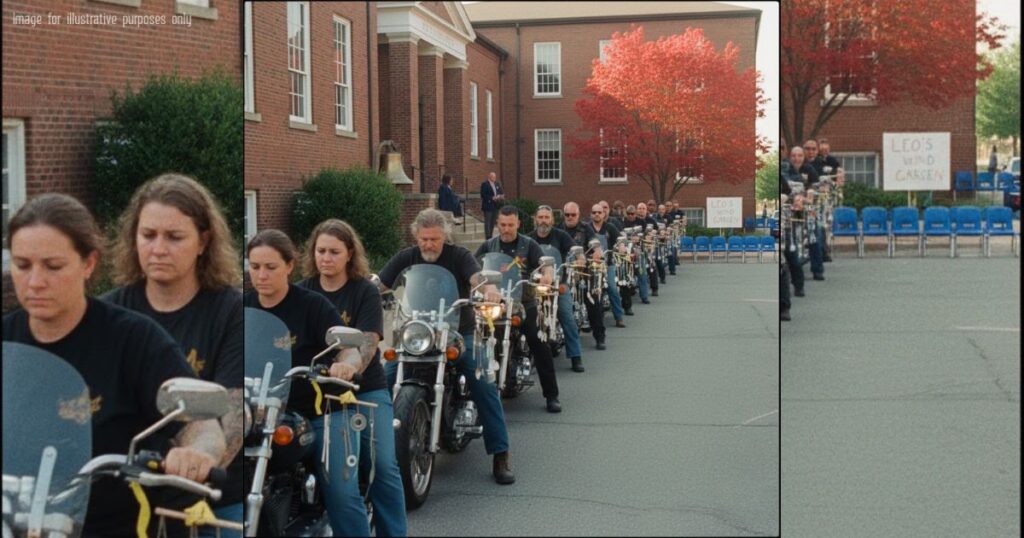Across the way, inside the courtyard, shoulders dropped.
People who had braced for thunder heard a lullaby.
A teacher touched her hand to her heart.
A boy in a blue shirt tilted his head like he’d recognized a language he’d always known.
The bell gave one clean note that stitched the moment to the streets that had brought us here.
My phone buzzed. Maya: I can hear it, Ray. It’s everywhere and it’s gentle. It sounds like him.
She followed with a photo: on the stage, a pinwheel and a picture of Leo in a baseball cap, his hair returning in brave commas. At the edge of the frame, Coleman stood with her hands folded, the tiniest wind lifting the program.
We held still when the wind settled, because silence, like sound, has an echo.
Then I nodded down the line and riders stepped back, palms on saddles.
We started to move—not engines—just legs and gravity and care.
Seventy-three bikes rolling at walking speed along the perimeter, a slow procession that made the neighborhood soften.
A child waved from the fence and we waved back with that awkward grace large people learn when trying to be gentle.
When the bell rang again and the chairs scraped on concrete, Coleman crossed the street.
She stopped at the curb like it was a border. I met her halfway. Up close, her blazer held a tiny gold ribbon pin.
“I couldn’t allow engines,” she said. “Not today. Not with how many children jump at sudden sounds. But I don’t think anyone will forget what you did.”
“We didn’t do much,” I said. “The wind did the heavy lifting.”
She glanced at the chime on my mirror.
It chimed once, polite as a nod. “Would you both come inside?” she asked. “There’s something the kids built. For Leo. For days like this.”
In the courtyard, beneath the maple, a half circle of short posts held small windmills the science club had made from cut plastic bottles and bamboo skewers.
A simple sign read LEO’S WIND GARDEN.
The L had been corrected in pencil by a careful hand.
Maya stood by the table, hands around a paper cup.
When she saw us, she smiled and didn’t swallow it back.
Coleman stepped away.
We tied one of our chimes to the lowest branch of the maple.
It sounded on its own, once, then waited with us.
A week later the district sent another email.
The policy now included guidelines for “quiet processions of support” on public sidewalks—no engines, no amplified sound, no slogans. I forwarded it to Maya. She sent a heart and a photo of the wind garden at sunset.
That evening I parked in the open mouth of my garage.
The chime we’d left on the maple had a twin here, made of the same spoons, the same washers, the same loop of plastic with his name.
I sat on the stool and watched it sway in the light. Somewhere a train horn drifted off-key—too far to be loud, near enough to be a memory.
I set my palm against the tank and let the motorcycle be exactly what it was: heavy and patient and ready, even when readiness meant staying still.
People say bikes are about noise and speed.
Maybe that’s true some days.
But the road teaches other lessons if you ride long enough: how to coast when the engine dies, how to read weather by what it does to weeds at the edge of a field, how to get small inside your jacket when the world asks you to.
It teaches that power isn’t only the sound you make, but the way you move without making any.
They banned engines from the school at 10:00 a.m. on the dot.
We showed up anyway—not to break a rule, but to keep a promise. We let the wind carry what words could not.
And on mornings when a spoon rings against a washer or a ribbon lifts for no reason I can see, I think about a boy who loved circles and how a community decided to become one.
Sometimes the gentlest song carries the farthest.
Sometimes the quiet thing is the one that changes the room.
We owe the wind more credit than we give it.
And to a kid with galaxy-colored pinwheels, we owe this promise: if the world ever fears our noise, we’ll bring our silence—and make it sing.
Thank you so much for reading this story!
I’d really love to hear your comments and thoughts about this story — your feedback is truly valuable and helps us a lot.
Please leave a comment and share this Facebook post to support the author. Every reaction and review makes a big difference!
This story is a work of fiction created for entertainment and inspirational purposes. While it may draw on real-world themes, all characters, names, and events are imagined. Any resemblance to actual people or situations is purely coincidenta


